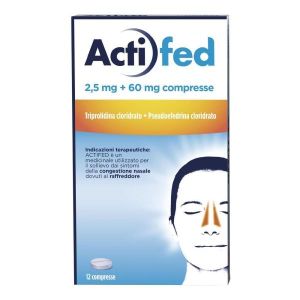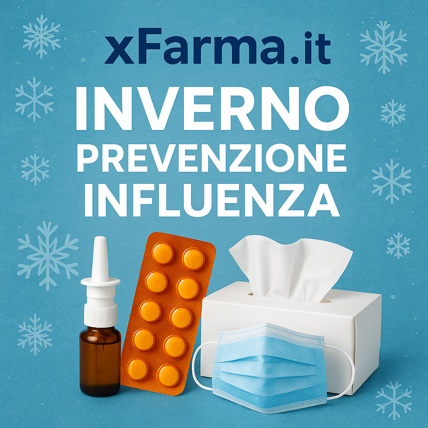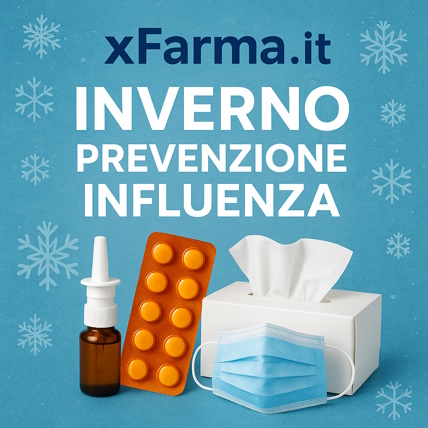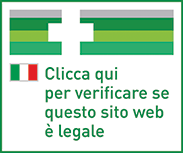Ship in Europe, Find out rates!
Language
Actifed 2,5mg + 60mg Pseudoephedrine Hydrochloride Decongestant 12 Tablets

Regular Price
€14.11
Special Price
€7.68
-46%
Save: €6.43
In stock
Recent lowest price:
€7.68
- box Delivery in Italy in 24/48 and free returns
- star3.000+ positive reviews
- dropboxOver 60,000 products in the catalog
Manufacturer
JOHNSON & JOHNSON
SKU
018723080
Active principle
PSEUDOEFEDRINA CLORIDRATO/TRIPROLIDINA CLORIDRATO
NAME
ACTIFED
PHARMACOTHERAPEUTIC CATEGORY
Nasal decongestants for systemic use.
ACTIVE PRINCIPLES
Triprolidine hydrochloride; pseudoephedrine hydrochloride.
EXCIPIENTS
Tablets: lactose; cornstarch; povidone; magnesium stearate. Syrup 100 ml: glycerol; sucrose; methyl para-hydroxybenzoate; sodium benzoate; quinoline yellow (E104); sunset yellow (E110); purified water.
INDICATIONS
Decongestant of the nasal mucosa, especially in case of colds.
CONTRAINDICATIONS / SECONDARY EFFECT
Hypersensitivity 'to the active ingredients, to other antihistamines or to any of the listed excipients; children under the age of 12; pregnancy and breastfeeding; in patients treated with monoamine oxidase inhibitors (MAOIs) or in the two weeks following such treatment, and in the treatment of lower respiratory tract diseases, including bronchial asthma. In such cases, concomitant use of the drug can cause an increase in blood pressure or hypertensive crises; glaucoma, prostatic hypertrophy, bladder neck obstruction, pyloric and duodenal stenosis or other tracts of the gastrointestinal and urogenital apparatus (due to its anticholinergic effects); cardiovascular diseases, arterial hypertension, hyperthyroidism, epilepsy and diabetes.
DOSAGE
Syrup: a measuring cup is attached to the package with level markings corresponding to the capacities of 5 and 10 ml. Adults and children over 12 years: a dose of 10 ml of syrup 2 - 3 times a day. >> Tablets. Adults and children over 12 years: one tablet 2 - 3 times a day. Do not exceed the recommended dose. Method of administration: oral use.
STORAGE
Syrup: keep away from light. Tablets: store at a temperature not exceeding 25 degrees C, in a dry place.
WARNINGS
If symptoms do not improve within 7 days or if high fever or other side effects occur, patients should be advised to discontinue treatment. Before taking triprolidine, patients with the following respiratory conditions such as emphysema, chronic bronchitis, or acute or chronic bronchial asthma, should be advised to consult a physician. Triprolidine can cause drowsiness and can increase the sedative effects of substances that depress the central nervous system such as alcohol, sedatives, tranquilizers. Patients should be advised that alcoholic beverages should be avoided during treatment and that they should consult their physician before taking the drug concomitantly with central nervous system depressant medications. At common therapeutic doses, antihistamines present highly variable secondary reactions from subject to subject and from compound to compound. For the posology in the elderly it is necessary to consider their greater sensitivity to antihistamines and to pseudoephedrine. Although pseudoephedrine did not produce important effects on blood pressure in normotensive subjects, the drug should not be taken by patients on antihypertensive, tricyclic antidepressants, sympathomimetic agents, such as decongestants, anorexics, amphetamine-like. Farmaoc should also not be used by patients with severe kidney or liver disease. The syrup contains sucrose. The drug tablets contain lactose.
INTERACTIONS
Acute hypertensive crises have been reported in the medical literature during concomitant use of monoamine oxidase inhibitors (MAOIs) and sympathomimetic amines. Pseudoephedrine exerts a vasoconstrictive action by stimulating adrenergic receptors and releasing noradrenaline from neuronal sites. Monoamine oxidase inhibitors (MAOIs) can potentiate the pressure effect of pseudoephedrine, as they prevent the metabolism of sympathomimetic amines and increase the releasable amount of noradrenaline in the adrenergic nervous tissue. The effects of antihistamines are made more evident by alcohol, hypnotics, sedatives, tranquilizers, and other substances with anticholinergic action or depressant effect on the central nervous system, which therefore should not be taken during therapy. Antihistamines can reduce the duration of action of oral anticoagulants. The use of antihistamines can mask the first signs of ototoxicity of certain antibiotics. Furazolidone causes a progressive inhibition of monoamine oxidase, so it should not be taken at the same time as the drug. The effect of antihypertensives that interfere with sympathetic activity (e.g. methyldopa, alpha and beta blockers, debrisoquine, guanethidine, betanidine and bretylium) can be partially canceled by the drug, which therefore, also in this case, should not be simultaneously assumed.
SIDE EFFECTS
Adverse reactions reported with a frequency> = 1%, identified in randomized placebo-controlled trials, with formulations containing pseudofedrine as a single active substance are presented below: dry mouth, nausea, dizziness, insomnia and nervousness. There are no placebo-controlled clinical trials with sufficient adverse reaction data for the combination of the active substances pseuoephedrine and triprolidine. Adverse reactions are listed below according to frequency categories using the following convention: very common (1/10); common (1/100 and <1/10); uncommon (1 / 1,000 and <1/100); rare (1/10,000 and <1 / 1,000); very rare (<1 / 10,000); not known. Psychiatric disorders. Very rare: anxiety, euphoric mood, hallucination, restlessness. Nervous system disorders. Very Rare: headache, paraesthesia, psychomotor hyperactivity (in the pediatric population), somnolence, tremor. Cardiac pathologies. Very Rare: arrhythmia, extrasystoles, palpitations, tachycardia. General disorders and administration site conditions. Very Rare: feeling nervous, asthenia. Disorders of the immune system. Very rare: hypersensitivity '. Respiratory, thoracic and mediastinal disorders. Moltorari: epistaxis. Gastrointestinal disorders. Very rare: vomiting, abdominal discomfort. Skin and subcutaneous tissue disorders. Very rare: itching, erythema, urticaria. Renal and urinary disorders. Very rare: dysuria, urinary retention. Diagnostic tests. Very rare: increased blood pressure. The drug can also cause dizziness, photosensitivity reaction, diarrhea, hyperviscosity of bronchial secretions, very rarely blood alterations and especially in the elderly, hypotension. The reporting of suspected adverse reactions that occur after the authorization of the medicine is important, as it allows continuous monitoring of the benefit / risk ratio of the medicine.
PREGNANCY AND BREASTFEEDING
The medicine is contraindicated during pregnancy and lactation.
ACTIFED
PHARMACOTHERAPEUTIC CATEGORY
Nasal decongestants for systemic use.
ACTIVE PRINCIPLES
Triprolidine hydrochloride; pseudoephedrine hydrochloride.
EXCIPIENTS
Tablets: lactose; cornstarch; povidone; magnesium stearate. Syrup 100 ml: glycerol; sucrose; methyl para-hydroxybenzoate; sodium benzoate; quinoline yellow (E104); sunset yellow (E110); purified water.
INDICATIONS
Decongestant of the nasal mucosa, especially in case of colds.
CONTRAINDICATIONS / SECONDARY EFFECT
Hypersensitivity 'to the active ingredients, to other antihistamines or to any of the listed excipients; children under the age of 12; pregnancy and breastfeeding; in patients treated with monoamine oxidase inhibitors (MAOIs) or in the two weeks following such treatment, and in the treatment of lower respiratory tract diseases, including bronchial asthma. In such cases, concomitant use of the drug can cause an increase in blood pressure or hypertensive crises; glaucoma, prostatic hypertrophy, bladder neck obstruction, pyloric and duodenal stenosis or other tracts of the gastrointestinal and urogenital apparatus (due to its anticholinergic effects); cardiovascular diseases, arterial hypertension, hyperthyroidism, epilepsy and diabetes.
DOSAGE
Syrup: a measuring cup is attached to the package with level markings corresponding to the capacities of 5 and 10 ml. Adults and children over 12 years: a dose of 10 ml of syrup 2 - 3 times a day. >> Tablets. Adults and children over 12 years: one tablet 2 - 3 times a day. Do not exceed the recommended dose. Method of administration: oral use.
STORAGE
Syrup: keep away from light. Tablets: store at a temperature not exceeding 25 degrees C, in a dry place.
WARNINGS
If symptoms do not improve within 7 days or if high fever or other side effects occur, patients should be advised to discontinue treatment. Before taking triprolidine, patients with the following respiratory conditions such as emphysema, chronic bronchitis, or acute or chronic bronchial asthma, should be advised to consult a physician. Triprolidine can cause drowsiness and can increase the sedative effects of substances that depress the central nervous system such as alcohol, sedatives, tranquilizers. Patients should be advised that alcoholic beverages should be avoided during treatment and that they should consult their physician before taking the drug concomitantly with central nervous system depressant medications. At common therapeutic doses, antihistamines present highly variable secondary reactions from subject to subject and from compound to compound. For the posology in the elderly it is necessary to consider their greater sensitivity to antihistamines and to pseudoephedrine. Although pseudoephedrine did not produce important effects on blood pressure in normotensive subjects, the drug should not be taken by patients on antihypertensive, tricyclic antidepressants, sympathomimetic agents, such as decongestants, anorexics, amphetamine-like. Farmaoc should also not be used by patients with severe kidney or liver disease. The syrup contains sucrose. The drug tablets contain lactose.
INTERACTIONS
Acute hypertensive crises have been reported in the medical literature during concomitant use of monoamine oxidase inhibitors (MAOIs) and sympathomimetic amines. Pseudoephedrine exerts a vasoconstrictive action by stimulating adrenergic receptors and releasing noradrenaline from neuronal sites. Monoamine oxidase inhibitors (MAOIs) can potentiate the pressure effect of pseudoephedrine, as they prevent the metabolism of sympathomimetic amines and increase the releasable amount of noradrenaline in the adrenergic nervous tissue. The effects of antihistamines are made more evident by alcohol, hypnotics, sedatives, tranquilizers, and other substances with anticholinergic action or depressant effect on the central nervous system, which therefore should not be taken during therapy. Antihistamines can reduce the duration of action of oral anticoagulants. The use of antihistamines can mask the first signs of ototoxicity of certain antibiotics. Furazolidone causes a progressive inhibition of monoamine oxidase, so it should not be taken at the same time as the drug. The effect of antihypertensives that interfere with sympathetic activity (e.g. methyldopa, alpha and beta blockers, debrisoquine, guanethidine, betanidine and bretylium) can be partially canceled by the drug, which therefore, also in this case, should not be simultaneously assumed.
SIDE EFFECTS
Adverse reactions reported with a frequency> = 1%, identified in randomized placebo-controlled trials, with formulations containing pseudofedrine as a single active substance are presented below: dry mouth, nausea, dizziness, insomnia and nervousness. There are no placebo-controlled clinical trials with sufficient adverse reaction data for the combination of the active substances pseuoephedrine and triprolidine. Adverse reactions are listed below according to frequency categories using the following convention: very common (1/10); common (1/100 and <1/10); uncommon (1 / 1,000 and <1/100); rare (1/10,000 and <1 / 1,000); very rare (<1 / 10,000); not known. Psychiatric disorders. Very rare: anxiety, euphoric mood, hallucination, restlessness. Nervous system disorders. Very Rare: headache, paraesthesia, psychomotor hyperactivity (in the pediatric population), somnolence, tremor. Cardiac pathologies. Very Rare: arrhythmia, extrasystoles, palpitations, tachycardia. General disorders and administration site conditions. Very Rare: feeling nervous, asthenia. Disorders of the immune system. Very rare: hypersensitivity '. Respiratory, thoracic and mediastinal disorders. Moltorari: epistaxis. Gastrointestinal disorders. Very rare: vomiting, abdominal discomfort. Skin and subcutaneous tissue disorders. Very rare: itching, erythema, urticaria. Renal and urinary disorders. Very rare: dysuria, urinary retention. Diagnostic tests. Very rare: increased blood pressure. The drug can also cause dizziness, photosensitivity reaction, diarrhea, hyperviscosity of bronchial secretions, very rarely blood alterations and especially in the elderly, hypotension. The reporting of suspected adverse reactions that occur after the authorization of the medicine is important, as it allows continuous monitoring of the benefit / risk ratio of the medicine.
PREGNANCY AND BREASTFEEDING
The medicine is contraindicated during pregnancy and lactation.
| Destination | Cost | Detail |
|---|---|---|
| Italy | €5,90* | 24/72H |
| Austria, France, Germany, Slovenia | € 13* | 3 days |
| Belgium, Luxembourg, Portugal, Netherlands, Spain | € 14* | 4 days |
| Bulgary, Cechia, Hungary, Poland, Romania, Slovakia | € 19* | 5 days |
| Denmark, Estonia, Finland, Ireland, Lithuania, Latvia ,Sweden | € 22* | 5 days |
| United Kingdom, Switzerland, Greece, Malta/td> | € 30* | 7 days |
| Canada | € 40 | 7 Days |
European shipments with express courier: FedEx, MBE, DHL
*For the shipment outside band B ther's an extra cost of 22€ *For the shipment outside band C ther's an extra cost of 30€ Delivery Times exclude Saturday and Holidays
For Islands and Areas of difficult Accessibility the shipments are made in 72 hours and the cost will be increased by 15€
The images of the products shown on our site are purely indicative and may differ in shape, color, text and packaging shown on them. Given the difficulty of updating all the products on our site in real time or any errors, XFarma.it, all products will be identified through SKU MINSAN (code of the Ministry of Health).


